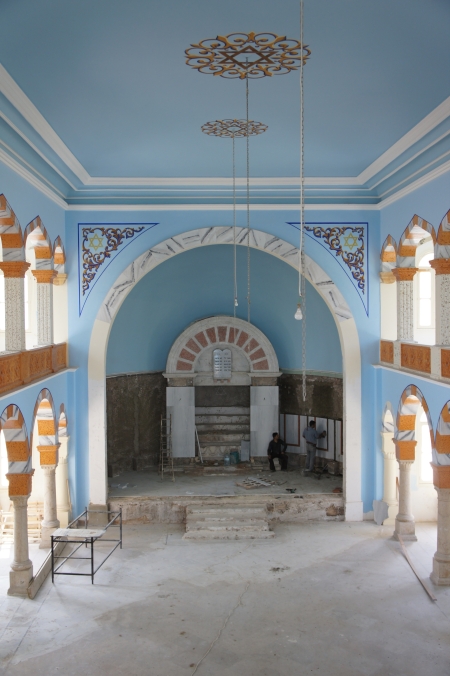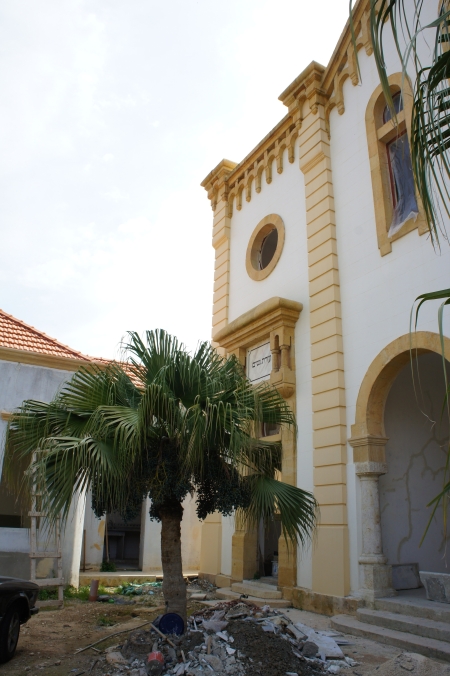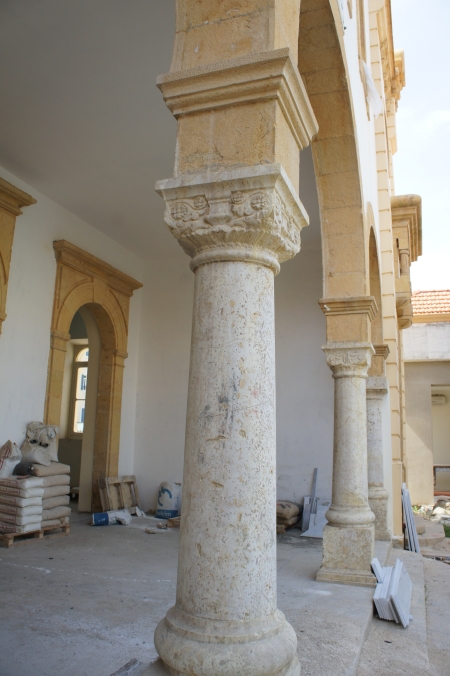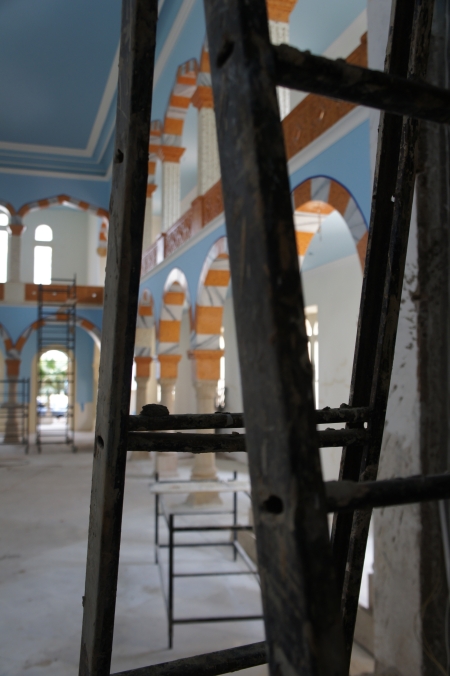Lebanese Jews
Rebuilding the synagogue and the community
It takes four security guards, two signed permits and a phone call to the colonel in charge of Lebanon’s internal security for the gates to open. Lebanon’s Jewish community is tiny, living in secrecy in a country that has endured several Israeli invasions and occupations. But even when the synagogue is completed, it – like the Jewish community – is likely to continue to maintain a low profile.
The guards gather outside the heavy metal gate behind which Lebanon’s minuscule Jewish community is rebuilding its synagogue, destroyed during the civil war. One of the four Syrian workers trundles past with a wheelbarrow full of Damascene marble for the Bat Zion, where the torah will one day be kept, oblivious to the commotion outside the gate. For the guards are shouting into their radios, deafened by the pneumatic drill from the neighbouring construction site, where yet another luxurious apartment block is growing into the skyline, dwarfing the synagogue on the opposite side of the road.
The synagogue is still located in the old neighbourhood of Wadi Abu Jmil, the historical Jewish part of town.
The colonel has granted his permission for the gates to be opened just as Isaac Arazi arrives. The head of the Jewish community in Lebanon is apologetic for the delay. Security is high around the synagogue and likely to remain so, even once the building work is completed. “There was an attack a month after we started building”, he explains. A man threw a Molotov cocktail at the building site. “A crazy man who read about the synagogue in the newspaper, but he was caught and is in prison now.” Is he afraid that something similar might happen again? Isaac shrugs and gestures to former Prime Minister Saad Hariri’s residence compound overlooking the site. Hariri’s home, like many politicians’ houses, is heavily guarded, and with it the neighbouring construction site.
Hariri’s late father Rafik, Lebanon’s post war prime minister, pushed the transformation of the ruined downtown area through Solidere, a publicly listed construction company. While the downtown reconstruction remains highly controversial in Lebanon, all the political parties were quick to give their consent to the building project. The synagogue is still located in the old neighbourhood of Wadi Abu Jmil, the historical Jewish part of town.
Security is high around the synagogue and likely to remain so, even once the building work is completed.
Isaac Arazi has a vision: he wants to revitalise the dwindling community, numbering less than 200 people. Isaac Arazi is unwilling to say just how many Jewish Lebanese live in the country. “You need to be at least ten people to celebrate Shabbat,” he says evasively. There are some 6.000 Jews on the Lebanese electoral list. “But most of them live abroad. And those that live here are too afraid to vote.” If they did, he says, it would be easy to find out how many they are. He gestures to a small office adjacent to the main building. “That will be the rabbi’s office”, he says proudly. Once the building is complete, the community will bring a rabbi to Beirut. From Turkey, he is quick to add.
At the moment, services are conducted in secret without a rabbi, in the congregation’s houses. The synagogue’s torah remains in Geneva, for now at least. His two daughters have left Lebanon, his son will leave as soon as he graduates. Despite their father’s ambitious plans for the community, they, like many other young Lebanese, are more interested in finding jobs abroad.
“That will be the rabbi’s office”, he says proudly. Once the building is complete, the community will bring a rabbi to Beirut. From Turkey, he is quick to add.
Before the civil war, some 15.000 Lebanese Jews lived in the country, mostly in Beirut, but also in Tripoli and other cities. With the outbreak of the civil war in 1975, many Jews, just like their fellow Muslim and Christian countrymen, left Lebanon. The remaining community’s accurate figure is unknown, but is said to be around 200 people.
Nabil de Freige is the Member of Parliament elected to represent seven minorities out of Lebanon’s eighteen recognised religious sects. After he first entered parliament in 2000, he went on a quest to find the remaining Jews in Lebanon. “I tried to find a Jewish representative. After all, I represent all the minority sects. But we couldn’t find anyone willing to come forward”, he says. He also tried to establish how many Jewish Lebanese actually live in the country. “In Lebanon you vote according to your sect. Since I was elected, only one Jew has voted.” For when it comes to voting, every polling station has eighteen booths, one for each sect. “The Jewish booths remain empty”, he says.
When it comes to voting, every polling station has eighteen booths, one for each sect. “The Jewish booths remain empty.”
Isaac Arazi has been busy, flying to Geneva, Paris and New York, collecting funds for his project. Many Lebanese Jews have done well for themselves in their new countries of choice: the US, Latin America and Europe, and, to a much less extent, Israel. Isaac Arazi has been tapping into this wealth, for the construction effort is being paid for almost entirely by private funds from the Lebanese diaspora, as well as some money from Solidere. Not though, de Freige emphasizes, donations from Israel. “Israel is officially our enemy. And you don’t take money from your enemy”, he smiles.
The idea of rebuilding the synagogue goes back to 2003, when a wealthy Jewish Lebanese businessman moved back to the country and decided to partially fund the reconstruction of the synagogue. The decision was taken in the Council of Ministers to give permission to rebuild the synagogue. “As far as I know, the decision was not heated at all”, de Freige recalls. “Particularly for Hezbollah it was no problem at all”, he says. After all, it is a great way for the party to show that it is tolerant of all faiths. “We accept all people: Christians, Jews, atheists”, Ibrahim Moussawi, Hezbollah’s spokesperson emphasises. The party explicitly supports the reconstruction of the synagogue, distinguishing between the state of Israel, which it opposes, and the Jewish religion, which it accepts.
The color scheme – blue walls, the yellow sandstone and white cement, representing the different building stages – is to a certain extent guesswork, modeled on churches and old houses in the region.
Yet despite the official rhetoric of acceptance, Isaac Arazi is unwilling to arrange a meeting with the architect, even for an off-the-record interview. “He’s afraid, he doesn’t want to be associated with the project”, Isaac says. Unlike the architect, Antony Awad is happy to talk. “This is probably the first and last synagogue I will work on,” Antony Awad says meditatively. For him, restoring the synagogue is about maintaining Lebanon’s cultural heritage and history. “I’m proud that Lebanon is rebuilding a synagogue”, he says. He has trawled through archives to find some pictures of what the original synagogue looked like. However, the pictures he found were black and white. The color scheme – blue walls, the yellow sandstone and white cement, representing the different building stages – is therefore to a certain extent guesswork, modeled on churches and old houses in the region. The stone columns inlaid with countless tiny fossils survived the war and would have been impossible to replace, as such fossil stones are no longer quarried. “They are priceless”, Antony Awad explains.
“Maybe we will be able to celebrate Shabbat in the synagogue this August or September.”
Isaac Arazi hopes that the synagogue will be completed before summer, when the Lebanese diaspora pours back to the country’s cities and beaches, and among them many Jews. “Maybe we will be able to celebrate Shabbat in the synagogue this August or September,” he says. Yet, security will remain tight, as long as there is no real peace in the region. “We will maintain a low profile,” he says. So, the security guards will most likely continue to question anyone trying to get more than a glimpse of the synagogue from the side-alley.
Written by Naomi Conrad.
6 thoughts on “Lebanese Jews”
Leave a Reply
You must be logged in to post a comment.












There were 1,800 Jews in Lebanon in 1974, not 200,000. In 1948 there were 5,000 Jews in Lebanon. Most left before the civil war due to fears of being treated like fellow Jews in other Arab countries (although Lebanon was exceptionally tolerant toward the Jewish community, unlike other Arab countries, for example Syria, where Jews endured pogroms in 1945 and 1947 an in 1949 all Jewish property was confiscated and bank accounts of Jews frozen).
I’m Lebanese.I have no pboelrm with Israel or Israelis. My only pboelrm is with the government. I wish I could say that I don’t care about politics but after meeting so many people whose homes were demolished in front of their eyes by bulldozers, whose family members and friends were slaughtered in the hundreds, who are being detained for years and years without charged, who can barely move within their own country because of the check points and who have had to live in terror of Israel attacking all their lives, I simply cannot ignore them. They know that where power and money is involved, no amount of international law, which Israel repeatedly violates on a daily basis, can save them.I would not have ignored South African Apartheid were I old enough to experience it (I’m 21). I would not have ignored Nazi, or British India, or British America or Fascist Italy, or Fascist Spain etc. and I cannot ignore Israel. It would be unfair and immoral of me to simply ignore those being slaughtered and those suffering from an on-going eradication and simply say let’s love each other everything will be fine.I have no hatred towards Israelis and, contrary to popular, beliefs, I’ve rarely met any Anti-Semite from Lebanon. Let me remind you that Lebanese and all Arabs are Semites themselves. We are all Semites. I have met many Islamophobes within Lebanon (fundamentalist Christians). The Anti-semites that people think Lebanon has are actually Anti-Zionists. And how can you blame them? We’ve all met at least one Palestinian refugee.Palestinians are told over and over again that they are the pboelrm. That there pathetic rockets and sticks and stones are the ones causing the conflict. Not Israel’s tanks, missiles, nuclear and chemical weapons and their countless ammunition. No, sticks and stones.Most Palestinians I’ve met are filled with so much despair in a world where some of the most powerful nations view them as pests, rather than human being.I repeat. I have no pboelrm with Israel. I’ve love to visit Tel Aviv someday but to say that somehow the pboelrm we have is simply because not enough people love is very naive. Israel’s government has to stop treating Palestinians like Pests, enclosing them in an open-air prison.
Hello,
I’am a german journalist, corrispondent of German National Radio in Italy, Rome. I will come in the end of this month to Beirut and I would like to interview someone of the jewish community about the restaoration of the Maghen Abraham Synagogue. Someone knows a person to be contacted?
Thanks,
Thomas Migge
0039-335-319007
I born in libanon at 1957 and i need my birth certificate ,my grain father its issac Diwan if anybody can help me to get that or have any contact i will
Thank